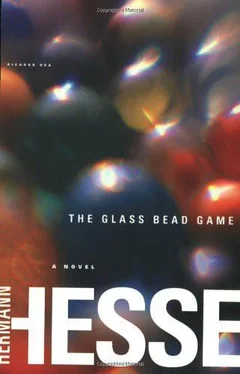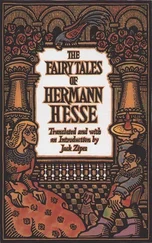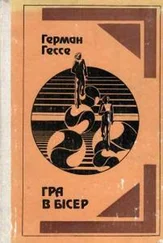Although we thus recognize the idea of the Game as eternally present, and therefore existent in vague stirrings long before it became a reality, its realization in the form we know it nevertheless has its specific history. We shall now attempt to give a brief account of the most important stages in that history.
The beginnings of the intellectual movement whose fruits are, among many others, the establishment of the Order and the Glass Bead Game itself, may be traced back to a period which Plinius Ziegenhalss, the historian of literature, designated as the Age of the Feuilleton, by which name it has been known ever since. Such tags are pretty, but dangerous; they constantly tempt us to a biased view of the era in question. And as a matter of fact the Age of the Feuilleton was by no means uncultured; it was not even intellectually impoverished. But if we may believe Ziegenhalss, that age appears to have had only the dimmest notion of what to do with culture. Or rather, it did not know how to assign culture its proper place within the economy of life and the nation. To be frank, we really are very poorly informed about that era, even though it is the soil out of which almost everything that distinguishes our cultural life today has grown.
It was, according to Ziegenhalss, an era emphatically “bourgeois” and given to an almost untrammeled individualism. If in order to suggest the atmosphere we cite some of its features from Ziegenhalss’ description, we may at least do so with the confidence that these features have not been invented, badly drawn, or grossly exaggerated. For the great scholar has documented them from a vast number of literary and other sources. We take our cue from this scholar, who so far has been the sole serious investigator of the Feuilletonistic Age. As we read, we should remember that it is easy and foolish to sneer at the mistakes or barbarities of remote ages.
Since the end of the Middle Ages, intellectual life in Europe seems to have evolved along two major lines. The first of these was the liberation of thought and belief from the sway of all authority. In practice this meant the struggle of Reason, which at last felt it had come of age and won its independence, against the domination of the Roman Church. The second trend, on the other hand, was the covert but passionate search for a means to confer legitimacy on this freedom, for a new and sufficient authority arising out of Reason itself. We can probably generalize and say that Mind has by and large won this often strangely contradictory battle for two aims basically at odds with each other.
Has the gain been worth the countless victims? Has our present structure of the life of the mind been sufficiently developed, and is it likely to endure long enough, to justify as worthwhile sacrifices all the sufferings, convulsions, and abnormalities: the trials of heretics, the burnings at stake, the many “geniuses” who ended in madness or suicide? For us, it is not permissible to ask these questions. History is as it has happened. Whether it was good, whether it would have been better not to have happened, whether we will or will not acknowledge that it has had “meaning” — all this is irrelevant. Thus those struggles for the “freedom” of the human intellect likewise “happened,” and subsequently, in the course of the aforementioned Age of the Feuilleton, men came to enjoy an incredible degree of intellectual freedom, more than they could stand. For while they had overthrown the tutelage of the Church completely, and that of the State partially, they had not succeeded in formulating an authentic law they could respect, a genuinely new authority and legitimacy. Ziegenhalss recounts some truly astonishing examples of the intellect’s debasement, venality, and self-betrayal during that period.
We must confess that we cannot provide an unequivocal definition of those products from which the age takes its name, the feuilletons. They seem to have formed an uncommonly popular section of the daily newspapers, were produced by the millions, and were a major source of mental pabulum for the reader in want of culture. They reported on, or rather “chatted” about, a thousand-and-one items of knowledge. It would seem, moreover, that the cleverer among the writers of them poked fun at their own work. Ziegenhalss, at any rate, contends that many such pieces are so incomprehensible that they can only be viewed as self-persiflage on the part of the authors. Quite possibly these manufactured articles do indeed contain a quantity of irony and self-mockery which cannot be understood until the key is found again. The producers of these trivia were in some cases attached to the staffs of the newspapers; in other cases they were free-lance scriveners. Frequently they enjoyed the high-sounding title of “writer,” but a great many of them seem to have belonged to the scholar class. Quite a few were celebrated university professors.
Among the favorite subjects of such essays were anecdotes taken from the lives or correspondence of famous men and women. They bore such titles as “Friedrich Nietzsche and Women’s Fashions of 1870,” or “The Composer Rossini’s Favorite Dishes,” or “The Role of the Lapdog in the Lives of Great Courtesans,” and so on. Another popular type of article was the historical background piece on what was currently being talked about among the well-to-do, such as “The Dream of Creating Gold Through the Centuries,” or “Physico-chemical Experiments in Influencing the Weather,” and hundreds of similar subjects. When we look at the titles that Ziegenhalss cites, we feel surprise that there should have been people who devoured such chitchat for their daily reading; but what astonishes us far more is that authors of repute and of decent education should have helped to “service” this gigantic consumption of empty whimsies. Significantly, “service” was the expression used; it was also the word denoting the relationship of man to the machine at that time.
In some periods interviews with well-known personalities on current problems were particularly popular. Ziegenhalss devotes a separate chapter to these. Noted chemists or piano virtuosos would be queried about politics, for example, or popular actors, dancers, gymnasts, aviators, or even poets would be drawn out on the benefits and drawbacks of being a bachelor, or on the presumptive causes of financial crises, and so on. All that mattered in these pieces was to link a well-known name with a subject of current topical interest. The reader may consult Ziegenhalss for some truly startling examples; he gives hundreds.
As we have said, no doubt a goodly dash of irony was mixed in with all this busy productivity; it may even have been a demonic irony, the irony of desperation — it is very hard indeed for us to put ourselves in the place of those people so that we can truly understand them. But the great majority, who seem to have been strikingly fond of reading, must have accepted all these grotesque things with credulous earnestness. If a famous painting changed owners, if a precious manuscript was sold at auction, if an old palace burned down, if the bearer of an aristocratic name was involved in a scandal, the readers of many thousands of feature articles at once learned the facts. What is more, on that same day or by the next day at the latest they received an additional dose of anecdotal, historical, psychological, erotic, and other stuff on the catchword of the moment. A torrent of zealous scribbling poured out over every ephemeral incident, and in quality, assortment, and phraseology all this material bore the mark of mass goods rapidly and irresponsibly turned out.
Incidentally, there appear to have been certain games which were regular concomitants of the feature article. The readers themselves took the active role in these games, which put to use some of their glut of information fodder. A long disquisition by Ziegenhalss on the curious subject of “Crossword Puzzles” describes the phenomenon. Thousands upon thousands of persons, the majority of whom did heavy work and led a hard life, spent their leisure hours sitting over squares and crosses made of letters of the alphabet, filling in the gaps according to certain rules. But let us be wary of seeing only the absurd or insane aspect of this, and let us abstain from ridiculing it. For these people with their childish puzzle games and their cultural feature articles were by no means innocuous children or playful Phæacians. Rather, they dwelt anxiously among political, economic, and moral ferments and earthquakes, waged a number of frightful wars and civil wars, and their little cultural games were not just charming, meaningless childishness. These games sprang from their deep need to close their eyes and flee from unsolved problems and anxious forebodings of doom into an imaginary world as innocuous as possible. They assiduously learned to drive automobiles, to play difficult card games and lose themselves in crossword puzzles — for they faced death, fear, pain, and hunger almost without defenses, could no longer accept the consolations of the churches, and could obtain no useful advice from Reason. These people who read so many articles and listened to so many lectures did not take the time and trouble to strengthen themselves against fear, to combat the dread of death within themselves; they moved spasmodically on through life and had no belief in a tomorrow.
Читать дальше












